#arknights laterano
Text
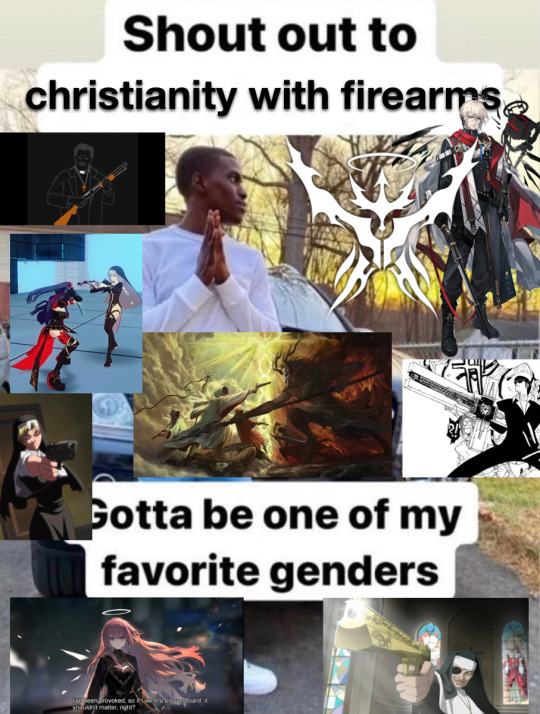
‘’I cast thee 9mm’’
#arknights#arknight executor#arknights laterano#laterano#arknights sankta#sankta#lemuen#arknights lemien#lemuen stood up!!#hortus de escapismo#black lagoon#trigun wolfwood#trigun#trimax#trimax wolfwood#nicholas d wolfwood#black lagoon sister yolanda#sister yolanda#black lagoon eda#faith the unholy trinity#father garcia#honkai impact 3rd#honkai kallen#kallen kaslana#the shotgun is a holy weapon no cap#christianity#arknights executor the ex foedere#executor the ex foedere#federico giallo#hypergryph
1K notes
·
View notes
Text
I feel like Characters with Disabilities need to be represented more so yeah here is Lemuen.

She is an NPC in Arknights, she is a Auxiliary Cardinal of the Laterano City, she's one of my favourite Characters in Arknights.She got into an Accident, which I will not spoil whoever wants to read about the Events she is in, she got into a Hospital and did therapy to walk again.
But even then she still uses the Wheelchair because it's even painful to Walk which I find is very Realistic to people who go to Therapy to learn to Walk again.
#arknights#arknights lemuen#arknights guiding ahead#arknights hortus de escapismo#arknights sankta#disability characters#disability#physical therapy#physically disabled#arknights laterano
60 notes
·
View notes
Text
Arknights Hortus de Escapismo Thoughts
An aspect about the story that I found interesting is how it shed light on the fact that Laterano and the Sankta have a stake in both the fate of the Sarkaz and the Church of the Deep. This can kinda be extended to the conflicts around the Seaborne and the Demons (but not as much for the Demons [haven't played that stupid Minecraft gamemode so I wouldn't know]). Laterano seems to be on the verge of a change and while we have an idea of who might be involved, what that change will bring remains to be seen.
I feel Stefano's ending captures the ideas they wanted to express with Andoain way better then he ever did.
Firstly, the age of Stefano gives his grievances a gravity that is lacking with Andoain. This applies both to the era of Stefano's life and how many years he's actually lived. Stefano has lived so long and that gives off the feeling that he knows what he's talking about when he speaks of his trials.
Secondly, Stefano's pain is much more palpable. Andoain advocates for outsiders but he doesn't give off the vibe of an outsider. He feels like a Laterano Sankta who just so happens to differ on this one issue. Stefano on the other hand, is a member of the abbey first. He is unsure of the Lateran Sankta even though they should have empathy to connect them. He fights for the Sarkaz because his principles built on experience cannot deny their humanity even when it's the best course to let them go.
Finally, Andoain just isn't rooted in this conflict. His inciting incident is wanting Lock and Key and breaking his team apart because of it. He leaves, starts a sort of cult, and just stops by because he can. Stefano on the other hand has to grapple with questions about Paradise because that is where both his faith and troubles lie. What is Paradise? Is it worth to enter a Paradise that runs counter to your principles? What does it mean to believe when your faith mandates some inhumanity? All these questions and more define the abbey's choice of going to Laterano but they plague Stefano most because he's their religious leader. And he used (and bent) religion as he saw fit because his principles, though rooted in faith, come first. Stefano (and Hortus de Escapismo as well) embodies this conflict is a much more depressing way than Guiding Ahead because they actually gave thought to what value Paradise holds when you have to watch it turn people away.
It's the difference between theory and practice in a sense. Andoain v. Yvangelista XI was a lot more talking and philosophizing. Stefano and all the rest of them have to actually grapple with the choice before them. Because they are actively being separated from family by seemingly nonsense rules. The higher-ups can wonder why the rules are unreasonable but they're not the one who have to slice their own heads off because their kin might be massacred based on their past crimes.
All this is to say that I am kinda disappointed that everything can be traced back to Arturia and her Arts. It makes an interesting series of events built on the divisive nature of Laterano seem hollower than it is. Like, oh if only Arturia's ride got here on time maybe Fortuna wouldn't be Fallen and Gerald wouldn't have killed himself (but Oren still had the troops so I dunno)
As much as the ideas explored were interesting, the Laterans themselves didn't see much development aside from Executor and even he went from brick to pondering brick. I don't know how good of a story this was overall; maybe a 6 out of ten because I do like it, just not as much as others of its type. Hopefully Viviana's event would give the Giallo siblings a better showing but whatever.
#arknights#arknights event#arknights executor#arknights arturia#arknights laterano#ramblings#really not sure how I feel overall#some things feel underdeveloped and random#and others feel like assigning Sankta something to do#looking at you Spuria#Oren is still an ass but what's new#lemuen arknights#Lemuen being mother was great
18 notes
·
View notes
Text
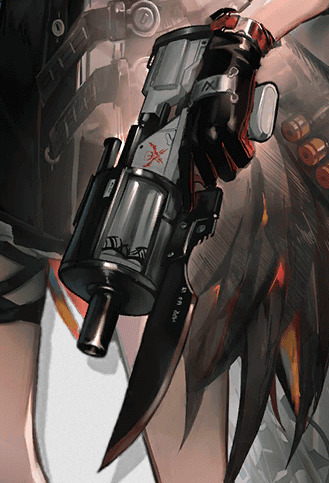
I was going to rag on fia for sticking a bayonet on her grenade launcher but it actually kind of makes sense. you get too close like ohoho im within your minimum effective range now! you cant shoot me without blowing up both of us! and then she fucking Gets you
#yeah yeah grenade launchers have minimum arming ranges to stop you from killing yourself. but i dont think laterano believes in gun safety#though also tbf she's prolly angry enough to not care about blowing herself up anyway#arknights
332 notes
·
View notes
Text
Not sure if anyone’s said this yet but now that we have Laterano events plural I’m fascinated by their (imo) very deliberate choice of protagonists, and there are almost a couple of layers of narrative going on there. I struggle a little figuring out how to get this into words but specifically I think they’re chosen to be people who can carry a narrative without contradicting the orthodox morals of the church. There’s a LOT of vaguely anti-authoritarian rambling below the cut so please kindly bear with me and my English major brain.
I can’t really start there though. One of the reasons this is so brain hurty is how deeply it’s woven into the storyline, so to start, I have to verbalize how Laterano and Arknights writing more generally is different from other, similar settings. Because like, I hear the words “morally negative church in a grimdark setting” and my brain immediately shuts off. Come on, that’s so far beyond low-hanging fruit, if you’ve seen any grimdark setting ever you know exactly what that looks like. And sure, it was fine the first two or three times you saw it, depending on your tolerance for that kinda thing, but it gets boring quick and even when it was new it was kinda uninteresting story-wise. “Religion is always fake because it inspires hope which means everyone who takes meaning from it is either a corrupt grifter or naive and misled” isn’t just edgy nonsense, it’s also basically useless as an actual critique. It tells you absolutely nothing except how to tune out a particular kind of story, and a story that tries to get you to hear less is doing its job wrong.
So, Arknights does something different. Instead of denying the premise of the church entirely, it actually takes it at its word. Laterano is, in almost every definition of the word, a paradise. It is basically unmatched in terms of actual quality of life, with its only competitors being the Durin cities and maybe Aegir, and is worlds apart from now much the rest of Terra sucks. More than that, though, the paradise is specifically tailored to the worldview of a religion with a strong central authority - when I say it takes it at its word, I mean the authoritarian bits too. Laterano is a city that lives in perfect order and peace because everyone follows the law perfectly and they all understand each other and never fight. Empathy is really important for this, as it allows for a believable amount of superhuman societal order. Laterano has very little crime, political drama, or quarrels in general. It’s the promises of a strict higher authority actually taken at face value: everyone follows the rules and that means they have effectively unfettered freedom, because they don’t want to break the rules and therefore they can do anything they want.
Laterano is specifically written to be a believable paradise in a setting that has none, so that when the story then turns around and criticizes that setting, it has significantly more weight. Even when the promises of paradise are taken at face value, there are still issues that cannot be addressed because the system is inherently flawed even in the imaginary scenario where it works. Even worse, the problems that poke holes in the imaginary perfect scenario are the same problems that they face in the real world, like “how do you deal with the interpretation of scriptures” and “hey there’s this racism thing I keep hearing about should we be worried about that or what”. Because of the way this imaginary perfect system works, we then look back on our real world in a new light and understand it a little better. It’s good critique.
Okay so how did we get here and what does this have to do with the protagonists? Well, this starts with Fiametta in Guide Ahead, because she’s a really weird protagonist. This is a cold take at this point but despite being the character on the front of the box, she has very little to actually do with the central conflict of the event. Most of the conflict is handled by Ezell first and Andoain second, and Fiametta mostly putters around putting holes in people until the finale where Andoain receives the answer he’s been looking for, he turns to explain it to the world, and he runs into the only person in the whole of Laterano who does not care about his motivations or his revelation. Her role, in other words, is to replace the climax of Andoain’s story with her own, and in doing so she makes it much harder to actually get a resolution and a meaning out of the story (this should not be taken as a criticism of her character, let me cook). Guide Ahead’s ending is hazy, with only small piecemeal resolutions to its conflicts, and for the longest time that was just the way the event was written and it stood on its own.
But now, Hortus de Escapismo is out and the monkey brain see patterns. Specifically, with the choice of protagonists. Because Executor is definitely different from Fiametta as a protagonist, but there’s one particularly important connection between the two, and that’s that as I mentioned in the beginning, they allow for stories don’t contradict orthodox morality. Fiametta we went over, as she’s uninterested in any of Andoain’s morality and just wants him dead. Executor, though, is purely focused on his mission and views the world through that lens. He only wants to achieve his objective, and while helping the needy is in line with the stated objectives of the church and he does do so when able, it’s secondary to his assigned task. He does change as he gets further into the story, and we’re not gonna ignore that, but we’ll be back to it later. What I mean is more that he is designed as a person who is able to lead a story that doesn’t contradict with the morals of Laterano. He sees the injustice and suffering around him, but that’s not his job, so he doesn’t need to solve it to have a complete story with a happy ending.
This is where it really gets complicated, so I apologize if I don’t explain this very well. I see this as us dealing with multiple layers of fiction: the events of the story, the perspective of the church, and our perspective as readers. Back to the first point - authoritarian institutions almost always use stories to sell people on their brand of order. Simple stories, simple enough that even calling them myths seems like overselling it a little, your “Saint George slays a dragon” kinda thing. This is the point of the second layer, the perspective of the church. I don’t really have an in-world justification for this layer - maybe you could make the argument that it has to do with Law’s perspective on things, but I don’t totally buy that - I think it’s more in a weird narrative transition space for people who don’t read very carefully. Regardless, Fiametta and Executor’s shared indifference to the questionable circumstances surrounding them is designed to let them tell a story to prop up the existing order. Their protagonist status and their missions are specifically constructed to allow them to ignore the suffering around them, and as such ignore the larger questions that might poke holes in the larger order. They’re both playing out the story of Saint George, where they go and find a bad guy and kill them and that’s all there is to it. The story is designed and told specifically for that “that’s all there is to it”.
But, as we said earlier, this is a good critique, and as such it intentionally undercuts this story with the third layer: what we actually see as readers. We are shown the suffering and the injustice, and then get to see our protagonists ignoring that to pursue their goals. This is what gives Guide Ahead’s ending its unique texture, which sets it apart from every other event with a vaguely unresolved ending. We have seen the actual issues with Laterano, and also watched our protagonist explicitly ignore them in favor of her own story. It’s unsatisfying in a way that only really makes sense to me if we as the readers have an understanding of intentional authorship. Whether it be Yvangelista XI or Law or The Actual Real Life Pope, there are issues here that we want to see a resolution to but people are choosing not to address them. Again, it’s good critique. Not only does it push the reader to unpack and understand the actual real-world technique, but it also helps blunt it. You have just seen a plot and protagonist ring uncharacteristically hollow. You then look around to see why that is, and you realize there are many things that should have been resolved that weren’t. The next time you see a story resolve with that same hollow-ness, you know where to look. Surprise! Harry Potter was propaganda the whole time. It’s okay, it was never good, you were just twelve.
I guess the last thing is where we go from here, because Executor’s story breaks this mold somewhat. In Hortus de Escapismo, he has to deal with a mission that isn’t actually bounded by his normal rules, and because of that he actually does have leeway to help the people around him. He starts as someone who is totally mission-focused, but by the end of the event he’s done a total 180 and is blocking Oren’s attack, which makes the mission harder but helps the non-mission-critical civilians of the monastery. He breaks from the rigid thinking of “kill the bad guy and that’s all there is do it”, and gives his attention to the people he isn’t supposed to see. I think this is an indication of the direction we’re going to be headed in the future with Laterano events. The events aren’t going to get better - they’re going to keep being just as morally murky and complicated as in the past - but the characters are going to get better at handling it, and when they do, they’re going to actually start to change things for the better.
Goddamn that was a lot of writing for 1 AM. I still have a. Lot of thoughts on this event with stuff like empathy and Lemuen and Federico being an autistic icon(my beloved) but I’m going to leave things there, I think, because if I write for any longer my phone is going to crash when I try to post this. Anyway if you actually made it to the end thanks for listening to me rambling and I hope that made sense. Cheers.
#arknights#arknights thoughts#hortus de escapismo#laterano#fiametta#executor arknights#I deadass had to ask folks to proofread this one#to make sure I didn’t sound like I didn’t sound off my rocker#also don’t mind my random Harry Potter slander that’s an entirely different rant
326 notes
·
View notes
Text
i like how most of arturia's "crines" mentioned in that lore thing the official twitter account posted involve stuff like
- inspiring a guy to declare himself emperor and campaign for rights for the infected
- getting a group of victorian soldiers to desert and become farmers instead of raiding a taran theatre
- whimsically lifting an elderly care home into the air with balloons and arts, to give the residents a bit of fun exitement :)
it gives a fun credence to the idea of her being laterano's criminal number one being less about her being the evilest person ever, and more bc she doesn't play by their (discriminatory and oppressive) rules
#arknights#shes the most ominous bastard ever but when you look at what she does#the reason shes seen as a villain by laterano is bc she consistently opposes the oppressive status quo lol#then again if she does something reaall evil in the leithania event i dont know of it i cant read chinese and do not look at fan tls much#you know. so dont get too mad at me if she personally makes a group of defenseless orphans brutally kill themselves or something#well#text
176 notes
·
View notes
Text
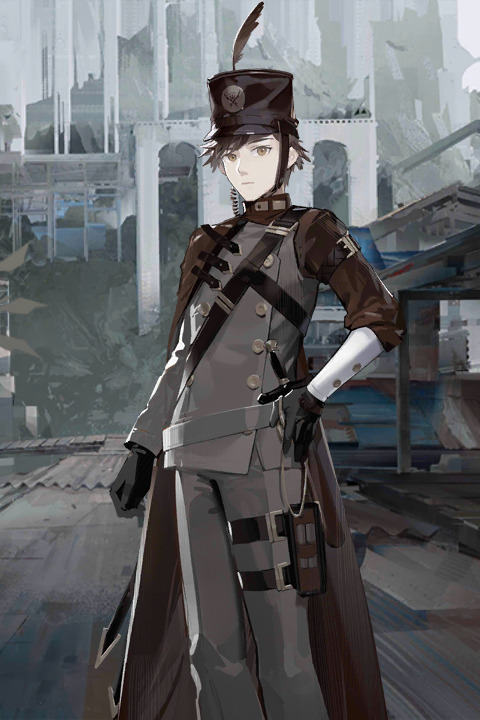

Okay, so. I saw this outfit and immediately thought of Plume.
Then I was reading these lines:

And I thought I would look over her files, just to see if I spotted anything.

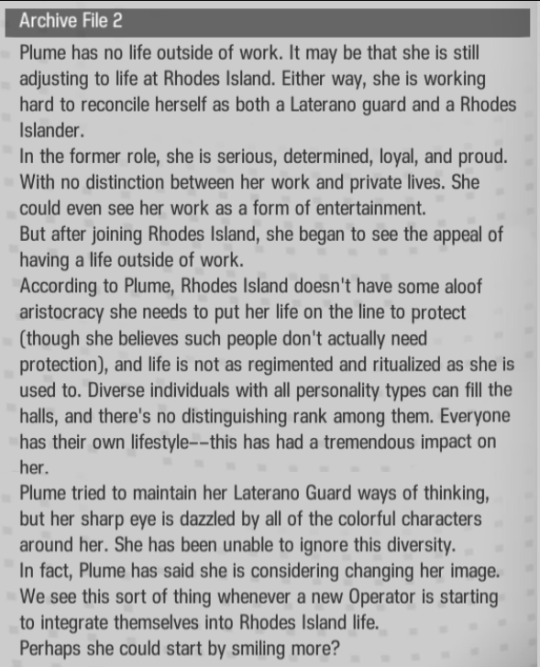
Yeah, this reads differently with a clearer picture of Laterano, and let me just say, It doesn't paint a good picture of Laterano's cultural norms.
The first time I read these files nothing really stuck out to me. It's an insular religious country and she was in the military. Things being regimented and ritualized is to be expected, and so is a general lack of awareness of other cultures. Sure, Plume didn't have a life outside of work, but that's not a particularly rare trait for a person to have.
What I missed the first time, was the references to an "aloof aristocracy", and the general framing of the traits being described not as Plume's but as a Laterano Guard's.
Why learn about the outside world if you're already living in paradise? What other pursuits could be more worthy of your time than defending it?
What I missed the first time, is that Plume is surprised that finding herself surrounded by foreign cultures is "not so bad."
#I don't know if I would call Laterano a distopia because it isn't the government propagandizing people into believing everything's perfect#but damn does it have some deeply rooted societal issues it refuses to acknowledge are a problem#arknights#laterano#hortus de escapismo#plume#ramblings
163 notes
·
View notes
Text
losing my shit at the fact that guide ahead is just andoian asking to stop racism and everyone hated this
#im having a main story moment of “am i really fighting a bad guy”#he's literally the chillest guy in laterano and is getting called mentally ill and a heretic for it#(i haven't done ga-8 yet i saw the loxic kolh at common drops and slapped 500 sanity in ga-7)#arknights
197 notes
·
View notes
Text
This can be said for a lot of Gacha, but I think Arknights and its characters have such potential for side games/fan games that we'll unfortunately never get to see. But it's still fun to think about how cool it would be.
Like, a JRPG featuring the Abyssal Hunters, they'd be perfectly suited for that kinda thing.
Rhine Lab could go either as a management builder game or a simulator of some kind. (Give me Kristen Space Program it would be funny)
Or a VA-11 Hall-A style game with the different operators at the cafeteria, featuring Gummy or Jaye as our protag.
God, just IMAGINE what an Arknights Metroidvania would look like.
#arknights#and yeah dating sim is a given just lemme smooch these girls already etc etc#also this conjured up the image of laterano and blacksteel ops in a CoD lobby
128 notes
·
View notes
Text


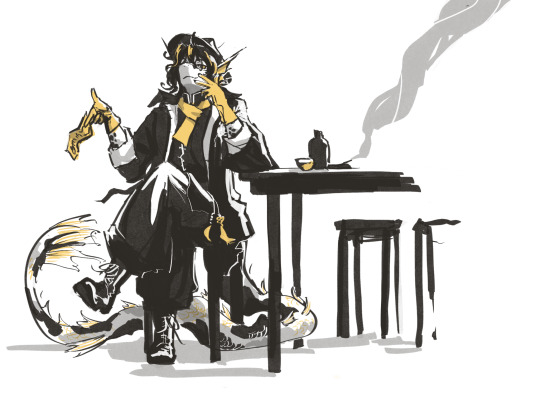




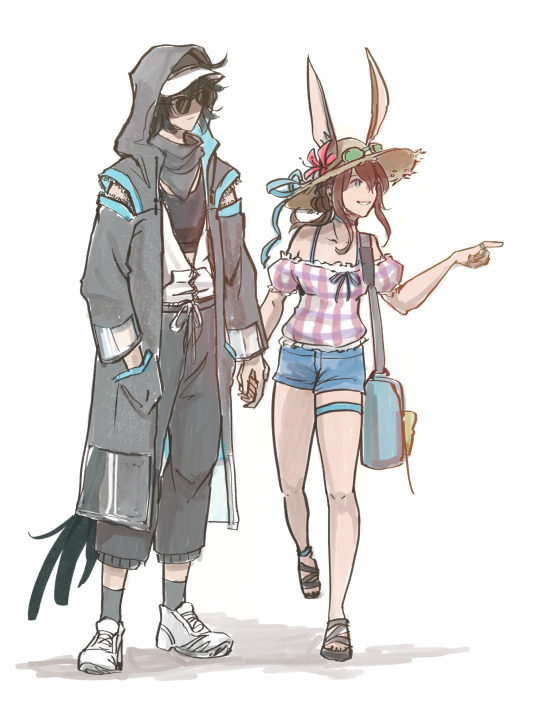
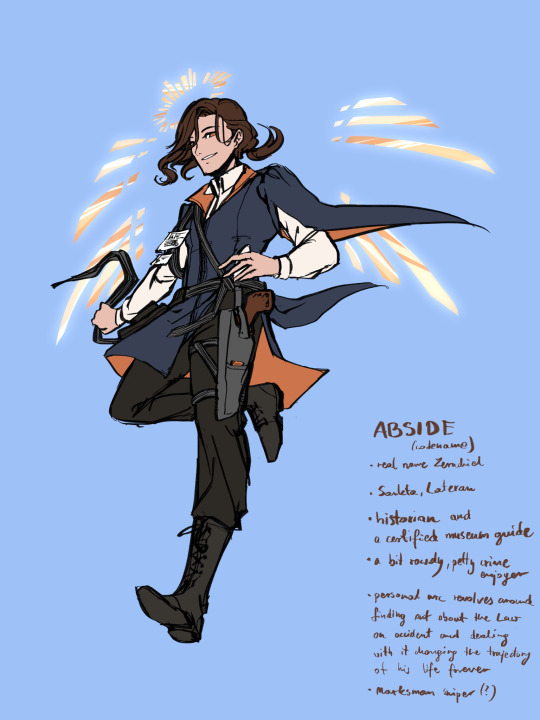
you know the drill by now. only arknights on the brain
operators, doctor, new oc
#cycha tries to be creative#arknights#the entire concept of laterano lives rent free in my head#angels running around the vatican trigger happy with their god given guns is the funniest shit ever ofc i had to make an oc
100 notes
·
View notes
Text



what it's like dating him.
❀. executor's love language is most definitely acts of service!
❀. whenever he goes out on missions, he attempts to complete them in a strictly-set timeframe. not because of whatever reason someone thinks is the case, but because he wants to make the most of the rest of the trip to get you souvenirs; things he thinks you might like.
❀. he's not so big on pda — the most one can get him to tolerate is hand-holding and cheek-kisses in public. however, he tends to be very receptive to affection.
❀. he enjoys being held. he'll curl up into your side when you both lie together, tucked underneath your chin.
❀. he's confident that, even in this position, he can protect you easily.
❀. he's a bit like a cat, honestly. he'll sidle up to you and rest his head on your shoulder, just...soaking in your warmth.
❀. he's the kind of boyfriend to, when you say you're cold, hold your hand and stick it in his coat pocket. of course, if this continues, he'll simply tug you closer so you can leech off his body heat.
❀. no, it's not just an excuse to hug you in public — what are you saying? (it is exactly that.)

💌 a message from tuneseeker! sorry this was done so late! to all the exe likers out there, this one's for you!
#❀. tuneseeker's cries#executor x reader#arknights x reader#navigation tags as follows >#laterano#executor
46 notes
·
View notes
Text
Big fan of the average Laterano being a fucking disaster person that regularly obtains municipal permission to blow shit up for kicks and giggles, big fan of the Laterano body of government being acutely aware that the people need to blow shit up on a regular basis so they don’t become rabid hyenas and start going Yosemite Sam on each other, big fan of the fucked up eldritch entity locked in the Laterano basement actually not being all that fucked up besides being a bit of a control freak but otherwise understanding that people want to blow shit up and more or less arranging things so they do that instead of going Yosemite Sam on each other, but primordially, HUGE fan of Ambriel being considered a weirdo by Laterano standards because she’s too chill and she doesn’t want to blow shit up nor does she go Yosemite Sam on others, she just wants to listen to Lofi Hip Hop Beats To Study while playing Scribblenauts on her Nintendo DS, none of that explosion shit for her.
795 notes
·
View notes
Text
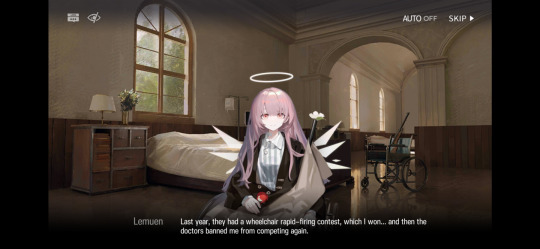
the hospital apparently throws enough “wheelchair rapid-firing contests” in an official enough capacity that the doctors have a ban list. if this is baseline gun catholic health care terra’s version of the knights hospitaller must be crazy oh wait
lemuen, who uses a sniper rifle, apparently managed to win one, despite it being well established that other sankta, most prominently lemuen’s sister, have access to automatic weapons
since she’s taking on more work (though not as a field operative) i doubt she was banned for health reasons, leaving me to conclude that they banned her for being too good
at whatever competitive wheelchair rapid-firing looks like
with her sniper rifle
i’m pretty sure the tube poking out from her blanket with a flower on the end of it is her gun
given that laterano is established to have a massive highly structured bureaucracy, they presumably have a version of osha. presumably it is buck wild
#arknights#lemuen#i hope if she's ever playable she keeps her wheelchair#liz's is stuck offscreen but i need to know what the laterano hospital wheelchair rapid fire champion can do
764 notes
·
View notes
Text
@arkiwii
I wrote some stuff about liberi in Laterano that I don’t know if I’ll include in my fanfic, but I thought you might find interesting.
====
Exusiai rolled her eyes. “No, Laterano doesn’t have laws against miscegenation. Sankta who have children with elders or ancients are as rare as sankta who don’t have children at all.”
She turned to Texas. “Bison wouldn’t seem like such a good idea if you knew for a fact that any kids you had would be born deaf and mute, right?”
The other girls at the table blanched. Sora asked, “Is it really that bad?”
“Our small population isn’t the only reason you see so few sankta outside of Laterano. It’s actually quite scary to leave home and feel like you’ve gone deaf because no one around you is making a ‘sound.’ And at the same time, it’s like no one can really ‘hear’ you either.”
She laughed at herself. “We think we’re ready for it, because Laterano has so many liberi. But it’s not the same at all. We have no idea how much Lateran liberi adapted to live with us until we meet a foreign liberi.”
“Like how?”
“Hmm. I think Lateran liberi make more noise; they talk a little louder, tap their feet, knock on walls. Unless they’re trying to be sneaky, they want to let us know when and where they’re around, without halos. That might be why we sankta started doing the same, to return the courtesy.
“Also, they look you in the eyes more, and make bigger expressions. Big smiles, big frowns, big gestures with their plumage. It’s a big shock to meet the first liberi who doesn’t try at all to let you know how they feel.”
Croissant spoke up. “Y’reckon yer own big smiles were a way of returnin’ courtesy? Instead of relying so much on yer halos that you all end up as flat-faced as Texas?”
Texas reacted not at all, which itself proved the point.
“Huh,” Exusiai said. “It’s weird to think about, but yeah. I suppose that’s possible.”
34 notes
·
View notes
Text
Something I appreciate about Hortus de Escapismo is how it portrays the Laterans and non-Laterans, especially in contrast to each other. Guide Ahead already gave us the angel ethnostate vs multi-racial heretics, which made for a pretty effective if blatant commentary on Laterano. And while it might seem Hortus is kind of repeating the same formula, I think it's got something subtler going on with interesting implications.
On one side we have the abbey's inhabitants: sankta, sarkaz and all other races--hell, even a seaborn for a moment. Are there cracks here and there? Of course, that's a whole plot point. But it can't be denied there is genuine camaraderie and self-sacrifice going on between these people who are simply trying to survive together (which is what makes those cracks all the more volatile).
Contrast this with the Laterans, who are dysfunctional as hell. Lemuen, Oren, Richele, and Spuria; I can't say I fully parsed everything happening between them on a moment-to-moment basis, but it was overall apparent that none of these people trust each other. Even though they're friends and classmates and colleagues, even though they're working for the good of the same state, even though they're sankta who can literally read each other's minds. There's just this constant mess of cahoots and conspiracy and treachery and bitter friction, and it takes the threat of an Innsmouth-Jonestown crossover event to get them to finally work together.
I thought it was a nice way to show more of Laterano's flaws. It's one of their core themes that they aren't as great as they say they are, but you'd think they would, at the least, have blessed harmony thanks to their literal hivemind. But evidently that isn't true either. And again, these are agents at the highest levels of the government. If they're this dysfunctional, what does that say for Laterano as a whole?
Which leads me into thinking about what the future of Laterano might have in store. I've seen some folks point out how these events have these greatly compelling premises that don't actually resolve any of the issues they bring up. Laterano only remains Laterano. And this is true! But I think it's intentional, setting up a slow burn of a regional conflict. The Lateran state is holding together, the status quo remains unchanged, the Law is content. But for how much longer? Guiding Ahead introduced us to the divide in Laterano on a broad level, the state vs heretics. Hortus de Escapismo shows the cracks within the state, narrowing in on individuals who nominally should be on the same side but aren't. The next logical narrative step would be seeing the state finally cracking apart from whatever looming danger the Law sainted Federico to deal with.
Some sort of schism, perhaps; that seems like the sort of existential threat that would directly threaten the Law's directive of preserving the Sankta. Law's awareness of it would also imply it's an internal threat, something festering in the hearts and minds of Sankta and thus one It's able to sense (at least that's what makes sense to me. We don't actually know how the Law works, so it could very well just have random magic prophetic abilities). And especially with the constant background pressure of trying to legitimize their Summit of Nations, what better way to drive that issue to the forefront by throwing Laterano into utter political chaos?
#arknights#a genuine schism would probably result in. so many fallen huh. would be interesting seeing laterano's community struggle with that#maybe the threat has something to do with the iberian church and seaborn? considering those were elements that appeared in hortus#and they were discussing a potential reconciliation between laterano and iberia too. reads like setup to me.#reaching out to iberia would be ripe for a widescale collision of ideologies that could lead to another schism#and for iberia it'd also be thematically relevant given their other estranged relationship w another glorious near mythical country#also i want to see the sankta face the seaborn. they're not so different if you think about it.#precursor tech hiveminds dedicated to the group's survival. one is hyperadaptive and ever spreading the other is conservative and insular.#so the ideological threat of a schism and the physical threat of the seaborn#...or maybe also the ideological threat of seaborn? they have their own church too after all#PAPAL SCHISM ARKNIGHTS EDITION. 3 POPES 3 POPES. LATERANO IBERIA WE MANY#oh uh and again a schism would result in so many fallen which could tie in the whole. yknow. thousand year race war w the sarkaz.#that's kinda super duper really important for laterano's themes#sorry i'm just writing a whole other post in these tags :P
61 notes
·
View notes
Text
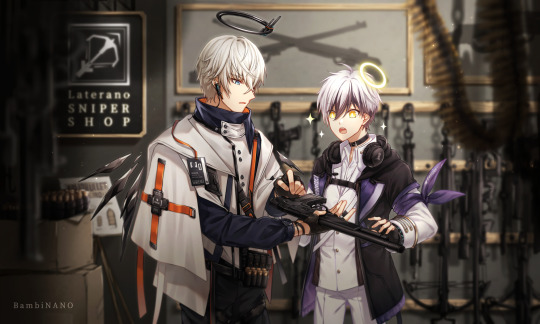
94 notes
·
View notes